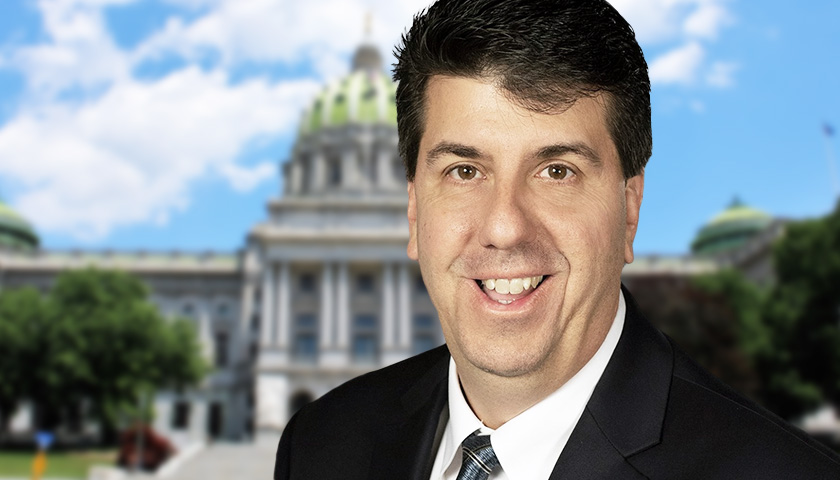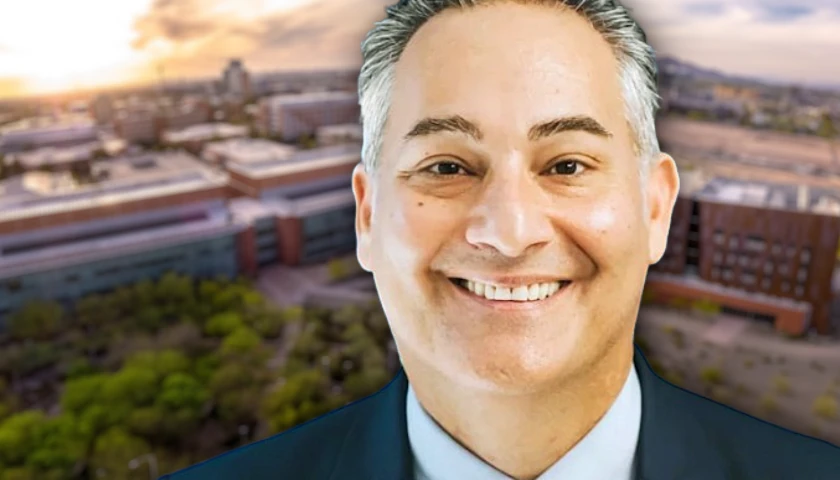A Pennsylvania lawmaker wants to use the state’s Rainy Day Fund to pay down the state’s unfunded pension liabilities that total more than $60 billion.
State Representative Joe Ciresi (D-Royersford) is asking colleagues to cosponsor a bill to move $670 million from the fund to the Public School Employees’ Retirement System (PSERS) and $330 million to the State Employees’ Retirement System (SERS). A memorandum describing his legislation avers it could save local real-estate taxpayers $2.1 billion over the next 20 years.
Cirsei (pictured above) said his earlier service on the Spring-Ford Area School Board and his more recent conversations with local officials from both parties accentuated his awareness of the burden with which unfunded retirement obligations saddle businesses and families. PSERS’s most recent actuarial report states the systems’s unfunded accrued liability was $45.5 billion in 2021 while while SERS’s latest financial shapshot shows an unfunded debt of $16.4 billion.
“This is an obligation that the state has had for a long time and has not paid [its] fair share,” Ciresi told The Pennsylvania Daily Star. “And the burden is coming on our local taxpayers.”
The representative noted the Rainy Day Fund, the commonwealth’s reserve account for use during economic downturns, reached a record high of nearly $5 billion. He insisted the pool, formally called the Budget Stabilization Reserve Fund, could therefore reasonably be used to address public-employee retirement obligations.
“The way I felt is, we have the money now, we put the money in the system, we pay it back and it lowers the commitment from the districts across the board for years to come,” he said. “We’re putting it into a fund that we should have been putting it in for years. Our burden is through the roof on this.”
His acknowledgement of the pension-debt problem may get economic conservatives’ praise, but his solution will likely prove more controversial.
“On one hand, it’s a great idea to talk about paying down our pension liability,” said Elizabeth Stelle, policy analysis director at the Harrisburg-based Commonwealth Foundation (CF). “The problem with the proposal is where it’s getting the money.”
Stelle observed that the Keystone State has constantly spent more taxpayer money than it received in a given year. History, she said, therefore cautions that such a sizable Rainy Day Fund won’t last long. She also cited the law that created the fund which stipulates that it be used during “emergencies” or “downturns of the economy which result in significant unanticipated revenue shortfalls.” Swelling retirement debt, she said, does not fit into these contours.
“This does not rise to the level of an unforeseen event,” she said. “We’ve all known about our pension unfunded liability for a very long time.”
Stelle said Ciresi and others who want to pay down public-employee retirement debt nonetheless have an opportunity to do so in a less risky manner. That’s because the state, according to the nonpartisan Independent Fiscal Office, retains significant federal aid received during the COVID-19 pandemic and will enjoy a budgetary balance of $6.68 billion at the end of June.
“With roughly $7 billion sitting in the state’s checking account at the end of this fiscal year, now would be a great time to redirect some of that money to paying down the unfunded pension liability,” she said.
The state, CF has long argued, could mitigate retirement debt by placing future employees in a 401(k)-style defined contribution (DC) system. Pennsylvania’s government pensions used to conform to the costlier defined benefit (DB) model, though former Governor Tom Wolf and Republicans who controlled the General Assembly compromised by adopting a DB/DC hybrid system in 2017.
Moving toward an outright DC system should also appeal to those who want Pennsylvania school districts to employ more teachers, Stelle added. A recent CF analysis determined that if the Keystone State followed the private sector’s lead in enrolling hires in DC plans, districts could have offered salaries of $20,000 more per year on average.
“That seems like a great way to encourage teachers,” she said.
– – –
Bradley Vasoli is managing editor of The Pennsylvania Daily Star. Follow Brad on Twitter at @BVasoli. Email tips to [email protected].
Photo “Joe Ciresi” by Rep. Joe Ciresi. Background Photo “Pennsylvania Capitol” by Farragutful. CC BY-SA 4.0.








